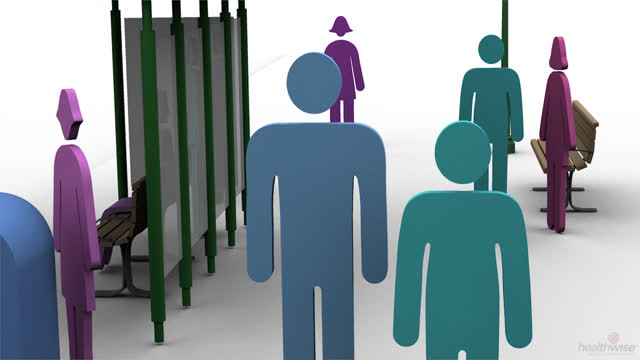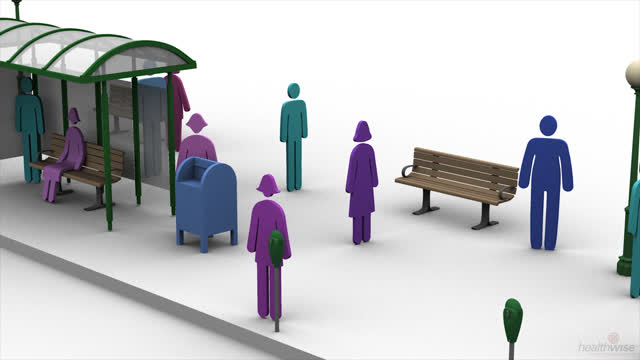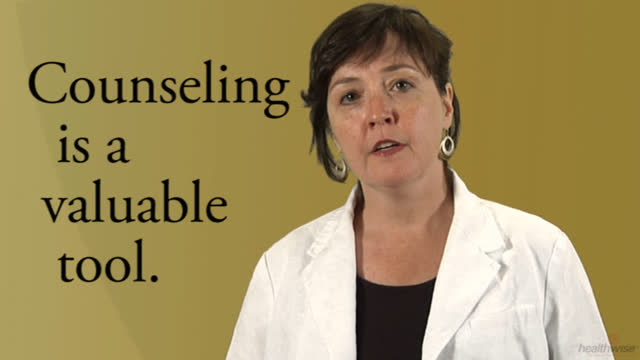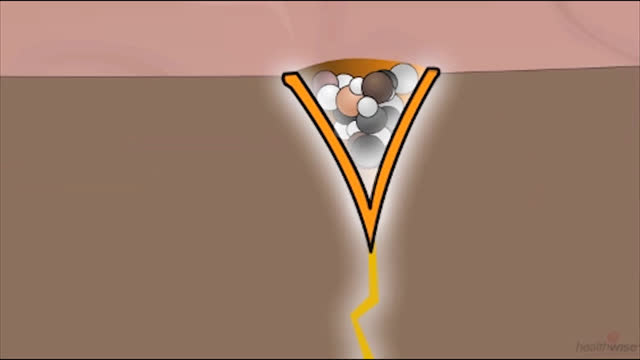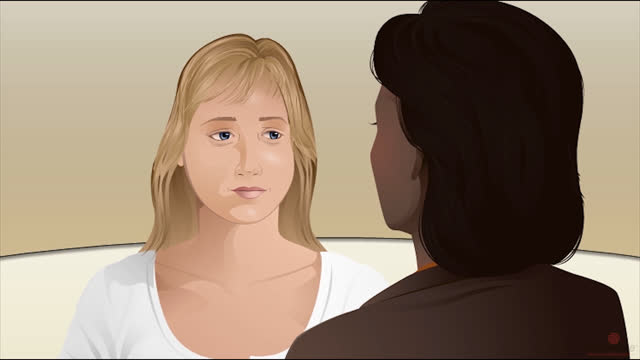Postpartum Depression
Topic Overview
Is this topic for you?
This topic is about major depression triggered by childbirth. It is different from the “baby blues,” which many women have in the first couple of weeks after childbirth. For more information, see Baby Blues.
What is postpartum depression?
Postpartum depression is a serious illness that can occur in the first few months after childbirth. It also can happen after miscarriage and stillbirth.
Postpartum depression can make you feel very sad, hopeless, and worthless. You may have trouble caring for and bonding with your baby.
Postpartum depression is not the “baby blues,” which usually go away within a couple of weeks. The symptoms of postpartum depression can last for months.
In rare cases, a woman may have a severe form of depression called postpartum psychosis. This is an emergency, because it can quickly get worse and put her or others in danger.
It’s very important to get treatment for depression. The sooner you get treated, the sooner you’ll feel better and enjoy your baby.
What causes postpartum depression?
Postpartum depression seems to be brought on by the changes in hormone levels that occur after pregnancy. Any woman can get postpartum depression in the months after childbirth, miscarriage, or stillbirth.
You have a greater chance of getting postpartum depression if:
- You’ve had depression or postpartum depression before.
- You have poor support from your partner, friends, or family.
- You have a sick or colicky baby.
- You have a lot of other stress in your life.
You are more likely to get postpartum psychosis if you or someone in your family has bipolar disorder (also known as manic-depression).
What are the symptoms?
A woman who has postpartum depression may:
- Feel very sad, hopeless, and empty. Some women also may feel anxious.
- Lose pleasure in everyday things.
- Not feel hungry and may lose weight. (But some women feel more hungry and gain weight).
- Have trouble sleeping.
- Not be able to concentrate.
These symptoms can occur in the first day or two after the birth. Or they can follow the symptoms of the baby blues after a couple of weeks.
If you think you may have postpartum depression, take a short quiz to check your symptoms:
A woman who has postpartum psychosis may feel cut off from her baby. She may see and hear things that aren’t there. Any woman who has postpartum depression can have fleeting thoughts of suicide or of harming her baby. But a woman with postpartum psychosis may feel like she has to act on these thoughts.
If you think you can’t keep from hurting yourself, your baby, or someone else, see your doctor right away or call 911 for emergency medical care. For other resources, call:
- The national suicide hotline at 1-800-273-TALK (1-800-273-8255).
- The National Child Abuse Hotline at 1-800-4-A-CHILD (1-800-422-4453).
How is postpartum depression diagnosed?
Your doctor will do a physical exam and ask about your symptoms.
Be sure to tell your doctor about any feelings of baby blues at your first checkup after the baby is born. Your doctor will want to follow up with you to see how you are feeling.
How is it treated?
Postpartum depression is treated with counseling and antidepressant medicines. Women with milder depression may be able to get better with counseling alone. But many women need both. Moms can still breastfeed their babies while taking certain antidepressants.
To help yourself get better, make sure you eat well, get some exercise every day, and get as much sleep as possible. Get support from family and friends if you can.
Try not to feel bad about yourself for having this illness. It doesn’t mean you’re a bad mother. Many women have postpartum depression. It may take time, but you can get better with treatment.
Health Tools
Health Tools help you make wise health decisions or take action to improve your health.
Cause
Postpartum depression seems to be triggered by the sudden hormone changes that happen after childbirth, miscarriage, or stillbirth. This is more likely in women who have certain risk factors, including previous depression. For more information, see What Increases Your Risk.
Symptoms
The two most common symptoms of depression are:
- Feeling sad or hopeless nearly every day.
- Losing interest in or not getting pleasure from most daily activities, and feeling this way nearly every day.
An especially serious symptom of depression is thinking about death and suicide. Some women with postpartum depression have fleeting, frightening thoughts of harming their babies.
Nearly every day, you may also:
- Lose or gain weight. You may also feel like eating more or less than usual.
- Sleep too much or not enough. You may also have trouble sleeping, even when your baby is sleeping.
- Feel restless and not be able to sit still, or you may sit quietly and feel that moving takes great effort. Others can easily see this behavior.
- Feel unusually tired or as if you have no energy.
- Feel unworthy or guilty. You may have low self-esteem and worry that people don’t like you.
- Find it hard to focus, remember things, or make decisions. You may feel anxious or worried about things.
Are you depressed?
If you have at least five of the above symptoms for 2 weeks or longer, and one of the symptoms is either sadness or loss of interest, you may have depression and may need treatment.
Even if you have fewer symptoms, you may still be depressed and may benefit from treatment. No matter how many symptoms you have, it’s important to see your doctor. The sooner you get treatment, the better your chance for a quick and full recovery.
If you think you may have depression, take a short quiz to check your symptoms:
Postpartum psychosis
This severe condition is most likely to affect women who have bipolar disorder or a history of postpartum psychosis. Symptoms, which usually start during the first 3 weeks (as soon as 1 to 2 days) after childbirth, include:
- Feeling removed from your baby, other people, and your surroundings (depersonalization).
- Disturbed sleep, even when your baby is sleeping.
- Extremely confused and disorganized thinking, increasing your risk of harming yourself, your baby, or another person.
- Drastically changing moods and bizarre behavior.
- Extreme agitation or restlessness.
- Hallucinations. These often involve sight, smell, hearing, or touch.
- Delusional thinking that isn’t based in reality.
Postpartum psychosis is considered an emergency requiring immediate medical treatment. If you have any psychotic symptoms, seek emergency help right away. Until you tell your doctor and get treatment, you are at high risk of suddenly harming yourself or your baby.
What Happens
Symptoms of postpartum depression start in the weeks to months after childbirth, miscarriage, or stillbirth.
In some cases, symptoms peak after slowly building for 3 or 4 months.
Fathers of new babies or partners of new moms can also experience postpartum depression.
Postpartum depression makes it hard for you to function well. This includes caring for and bonding with your baby.
In rare cases, dangerous postpartum psychosis symptoms can occur within the first few postpartum weeks, as soon as a few days after childbirth.
Early treatment counts
Early treatment is important for you, your baby, and the rest of your family. The sooner you start, the more quickly you will recover. And there’s less chance that your depression will affect your baby. Babies of depressed mothers might be less attached to their mothers and might lag behind developmentally in behavior and mental ability.
For more information about who is more likely to have postpartum depression, see What Increases Your Risk.
What Increases Your Risk
A risk factor is anything that increases your chances of having a certain problem. Risk factors for postpartum depression include:
- A history of postpartum depression. This puts you at high risk of having it again.
- Poor support from family, partner, and friends.
- High life stress, such as a sick or colicky newborn, financial troubles, or family problems.
- Physical limitations or problems after childbirth.
- Depression during a current pregnancy.
- Previous depression.
- Bipolar disorder, also known as manic-depression. It also increases the risk of dangerous psychotic behavior after childbirth.
- A family history of depression or bipolar disorder.
- Previous premenstrual dysphoric disorder (PMDD), which is the severe type of premenstrual syndrome (PMS).
Risk factors for postpartum psychosis include:
- A personal or family history of bipolar disorder.
- Previous postpartum psychosis.
When should you call your doctor?
Call 911, the national suicide hotline at 1-800-273-TALK (1-800-273-8255), the National Child Abuse Hotline at 1-800-4-A-CHILD (1-800-422-4453), or other emergency services right away if:
- You or someone you know is thinking seriously of suicide or has recently tried suicide. Serious signs include these thoughts:
- You have decided on how to kill yourself, such as with a weapon or medicines.
- You have set a time and place to do it.
- You think there is no other way to solve the problem or end the pain.
- You feel you cannot stop from hurting yourself, your baby, or someone else.
Call a doctor right away if:
- You hear voices.
- You have been thinking about death or suicide a lot, but you do not have a suicide plan.
- You are worried that your feelings of depression or thoughts of suicide are not going away.
Seek care soon if:
- You have symptoms of depression, such as:
- Feeling sad or hopeless.
- Not enjoying anything.
- Having trouble with sleep.
- Feeling guilty.
- Feeling anxious or worried.
- You have been treated for depression for more than 3 weeks, but you are not getting better.
Who to see
Your pregnancy health professional may be the first person to note and diagnose postpartum depression. This is one of many reasons why it’s important to have a medical check 3 to 6 weeks after childbirth.
Diagnosis and treatment of postpartum depression can be provided by a:
Counseling can be provided by a:
- Psychologist.
- Social worker.
- Licensed professional counselor.
- Psychiatrist (all prescribe medicine, and many also provide counseling).
Exams and Tests
For part of your postpartum checkup, your doctor typically asks you about your moods and emotions.
Your doctor may check your thyroid-stimulating hormone (TSH) levels to make sure a thyroid problem isn’t causing any depression symptoms.
Early detection
If you have had depression, postpartum depression, or postpartum psychosis before, are now pregnant and have depression, or have bipolar disorder, ask your doctor and family members to watch you closely. Some experts suggest that high-risk women have their first postnatal checkup 3 or 4 weeks after childbirth, rather than the usual 6 weeks.
Treatment Overview
Talk to your doctor about your symptoms, and together you can decide what type of treatment is right for you.
Treatment choices include:
- Counseling for both you and your partner. Counseling can give you emotional support and help with problem solving and goal setting. For more information, see Other Treatment.
- Antidepressant medicine.It relieves symptoms of postpartum depression for most women. For more information, see Medications.
Women with moderate to severe postpartum depression are advised to combine counseling with antidepressant medicine. Women with mild depression are likely to benefit from counseling alone.
You may also benefit from:
- A part-time or full-time mother’s helper.
- Parent coaching or infant massage classes, for strengthening mother-baby attachment.
How long do you need to take antidepressant medicine?
Antidepressants are typically used for 6 months or longer, first to treat postpartum depression and then to prevent a relapse of symptoms.
To prevent a relapse, your doctor may recommend that you take medicine for up to a year before considering tapering off of it. Women who have had several bouts of depression may need to take medicine for a long time.
Prevention
Keeping your body and mind strong and healthy will help reduce the effects of hormone changes and stress that come with childbirth.
- Ask for help from others so you can get as much sleep, healthy food, exercise, and overall support as possible.
- Stay away from alcohol, caffeine, and other drugs or medicines unless recommended by your doctor.
- If you are worried about postpartum depression, have your first postnatal checkup 3 or 4 weeks after childbirth rather than the usual 6 weeks.
High-risk women
Women whose risk is higher for the reasons listed below may want to take extra steps to prevent postpartum depression.
- A history of depression. If you have no depression symptoms late in a first pregnancy, watchful waiting is recommended. But if you have a history of severe depression, some experts recommend counseling and support before childbirth. You and your doctor may choose to start antidepressant medicine after the birth, particularly if you have had postpartum depression before.
- A history of postpartum depression. After childbirth, don’t wait for symptoms to appear. Start with counseling and support (some women start counseling a couple of months before childbirth). You and your doctor may choose a combination of counseling and an antidepressant.
- Depression during your pregnancy. If you took an antidepressant medicine during pregnancy, continue taking it after the birth to reduce your high risk of postpartum depression.
- Domestic violence. The potential for domestic violence increases during a woman’s pregnancy and when a couple is adjusting to a new baby. If your partner is violent or emotionally abusive, you and your baby are physically at risk, and you have a higher risk of postpartum depression. Now more than ever, it’s crucial that you protect yourself and your baby. Seek support and help. For more information, see the topic Domestic Violence.
Home Treatment
Postpartum depression is a medical condition. It’s not a sign of weakness. Be honest with yourself and those who care about you. Tell them about your struggle. You, your doctor, and your friends and family can team up to treat your symptoms.
There’s a lot you can do for yourself at home to cope with postpartum depression, from getting regular exercise to joining a support group.
Medications
Antidepressants are commonly used, usually in combination with counseling and support.
You may start to feel better within 1 to 3 weeks of taking antidepressant medicine. But it can take as many as 6 to 8 weeks to see more improvement. If you have questions or concerns about your medicines, or if you don’t notice any improvement by 3 weeks, talk to your doctor.
Antidepressants are typically used for at least 6 months, first to treat postpartum depression and then to prevent a relapse of symptoms. To prevent a relapse, your doctor may recommend that you take medicine for up to a year before you think about stopping it. Women who have had several bouts of depression may need to take medicine for a long time.
Can you take antidepressant medicine and breastfeed your baby?
Treating your depression is very important for your baby. Breastfeeding is good for your baby’s health. And it’s good for your baby’s bond with you. At best, you will be able to treat your depression and breastfeed your baby. But if you decide to choose between taking medicine and breastfeeding, take the medicine.
Medicine choices
- Antidepressants, such as fluoxetine (Prozac), sertraline (Zoloft) and amitriptyline, are generally thought to be safe for use while breastfeeding. Check with your doctor to be sure.
- Selective serotonin reuptake inhibitors (SSRIs) are usually the first-choice medicines. Most SSRIs are thought to be safe for use while a woman is breastfeeding. That’s because SSRIs generally pass into the breast milk at low levels.
- Tricyclics are generally thought to be safe for use while a woman is breastfeeding.
Other Treatment
Poor family and social support and high stress raise the risk of postpartum depression. For this reason, every woman with a new baby needs plenty of support from family and friends. Any special care you get will help you get through the challenges of the postpartum period.
Counseling
Counseling helps prevent and treat depression during pregnancy and after childbirth. To improve treatment success, both parents should try to take part.
- Cognitive-behavioral therapy helps you take charge of the way you think and feel.
- Interpersonal counseling provides emotional support and help with problem solving and goal setting.
Your doctor may recommend a licensed counselor who specializes in treating postpartum depression. To effectively treat depression, it’s important that you and your counselor have a comfortable relationship.
Alternative treatment
- Light therapy hasn’t been widely studied for postpartum depression. But it helps depression during pregnancy, winter-related depression (seasonal affective disorder), and general depression.
- Parent coachingoffers both education and support for handling baby care and problems as well as for the personal and couple transition into parenthood.
- Infant massageclasses teach you skills for physically and emotionally bonding with your baby. And they give you a chance to spend time with other mothers.
In rare cases, electroconvulsive therapy is used to treat severe forms of depression. It works well as short-term treatment.
References
Other Works Consulted
- Abajo FJ, Garcia-Rodriguez LA (2008). Risk of upper gastrointestinal tract bleeding associated with selective serotonin reuptake inhibitors and venlafaxine therapy. Archives of General Psychiatry, 65(7): 795–803.
- American College of Obstetricians and Gynecologists (2008, reaffirmed 2009). Use of psychiatric medications during pregnancy and lactation. ACOG Practice Bulletin No. 92. Obstetrics and Gynecology, 111(4): 1001–1020.
- American College of Obstetricians and Gynecologists (2010). Screening for depression during and after pregnancy. ACOG Committee Opinion No. 453. Washington, DC: American College of Obstetricians and Gynecologists.
- O’Hara MW, Segre LS (2008). Psychologic disorders of pregnancy and the postpartum period. In RS Gibbs et al., eds., Danforth’s Obstetrics and Gynecology, 10th ed., pp. 504–514. Philadelphia: Lippincott Williams and Wilkins.
- Spinelli MG (2009). Postpartum psychosis: Detection of risk and management. American Journal of Psychiatry, 166(4): 405–408.
- Yonkers KA (2014). Management of depression and psychoses in pregnancy and in the puerperium. In RK Creasy et al., eds., Creasy and Resnik’s Maternal-Fetal Medicine, 7th ed., pp. 1122–1131. Philadelphia: Saunders.
Current as of: May 28, 2019
Author: Healthwise Staff
Medical Review:Patrice Burgess, MD, FAAFP – Family Medicine & Kathleen Romito, MD – Family Medicine & Lisa S. Weinstock, MD – Psychiatry
This information does not replace the advice of a doctor. Healthwise, Incorporated, disclaims any warranty or liability for your use of this information. Your use of this information means that you agree to the Terms of Use. Learn how we develop our content.


